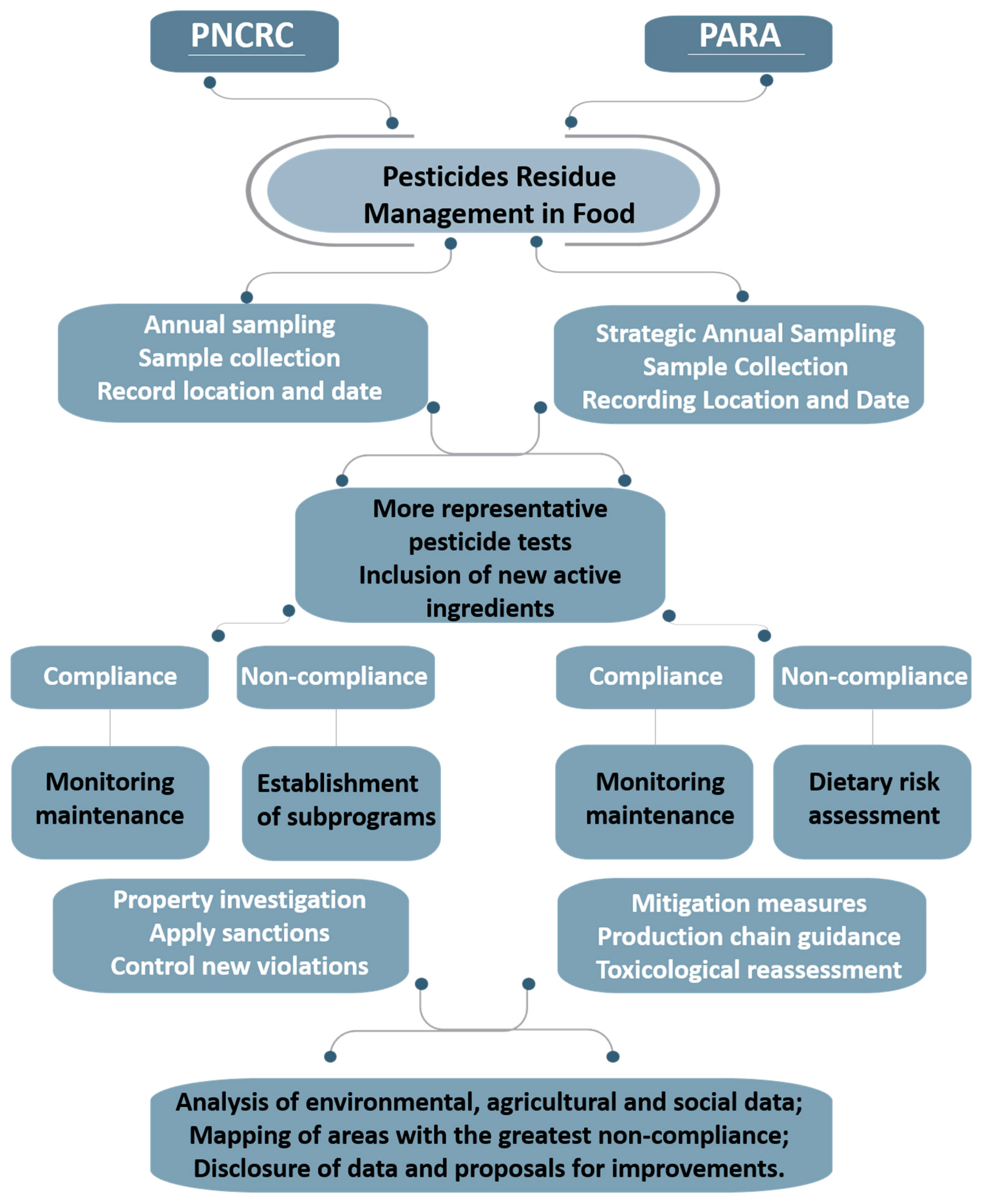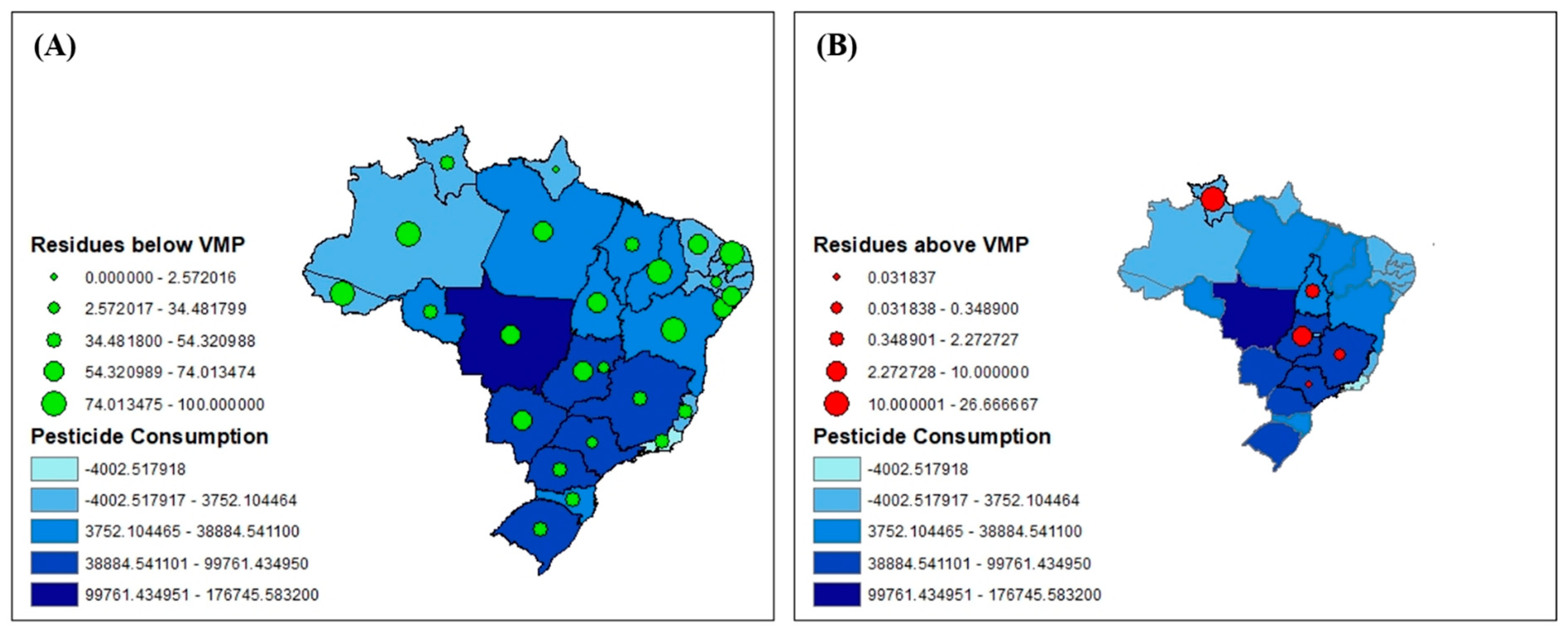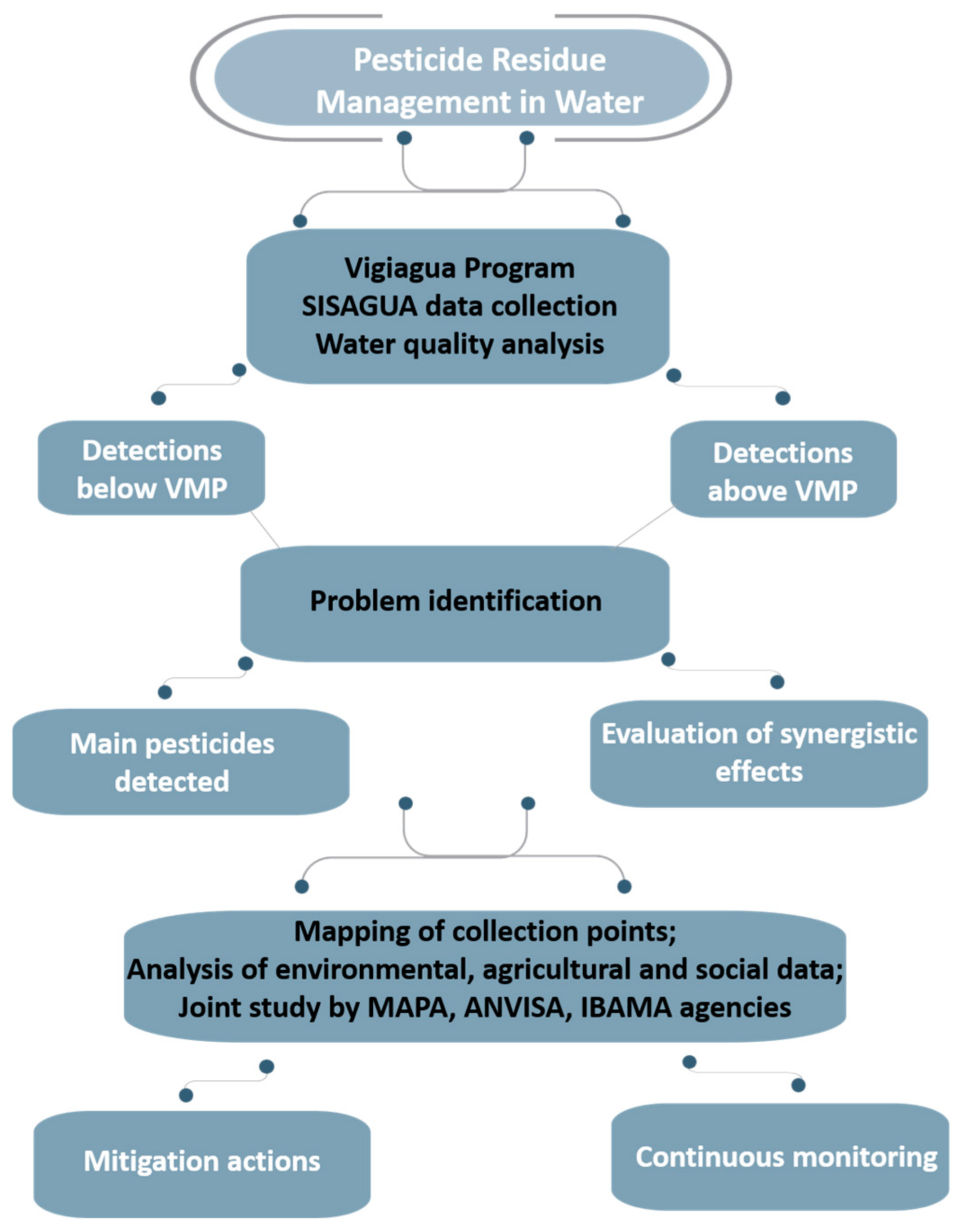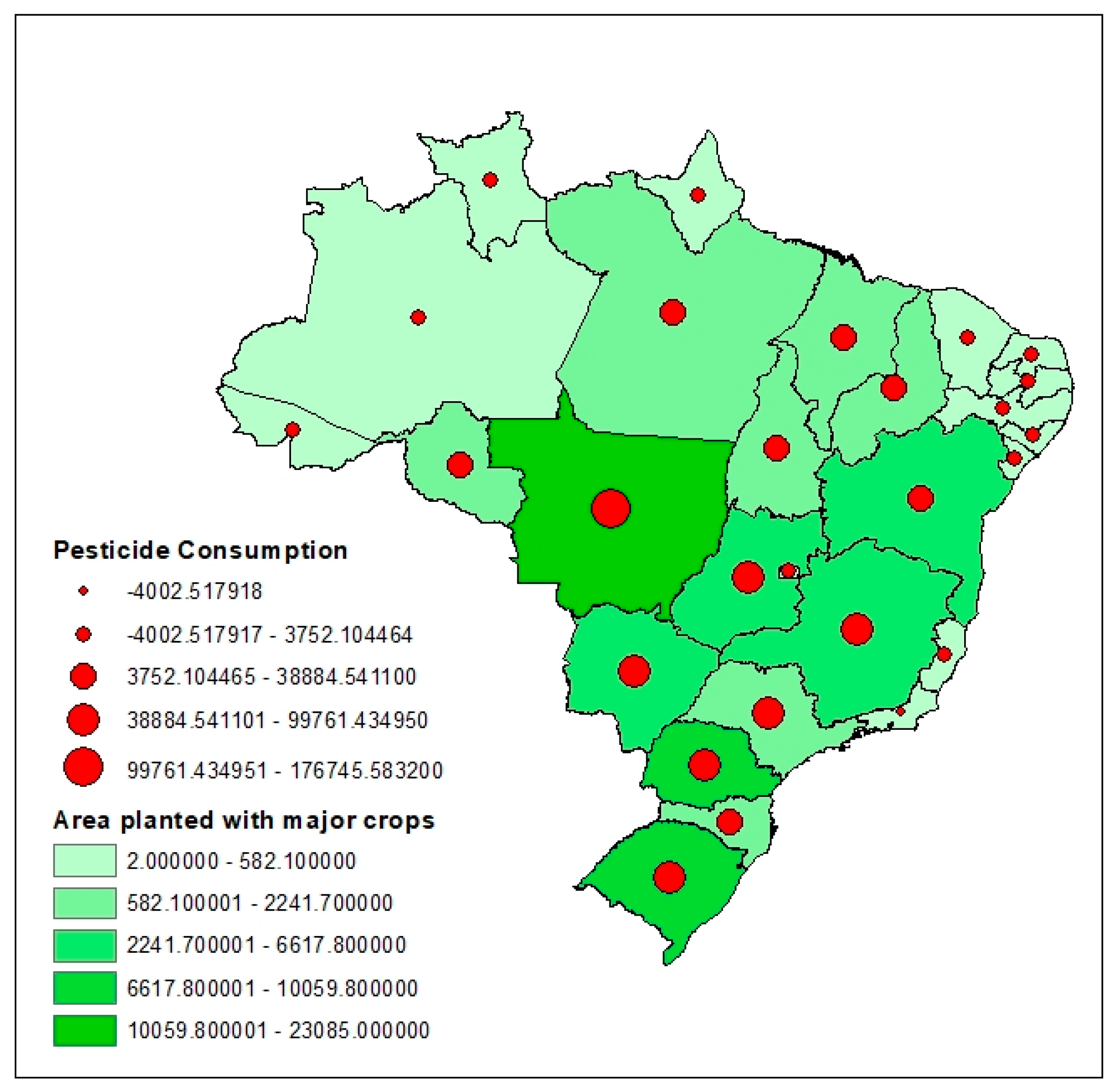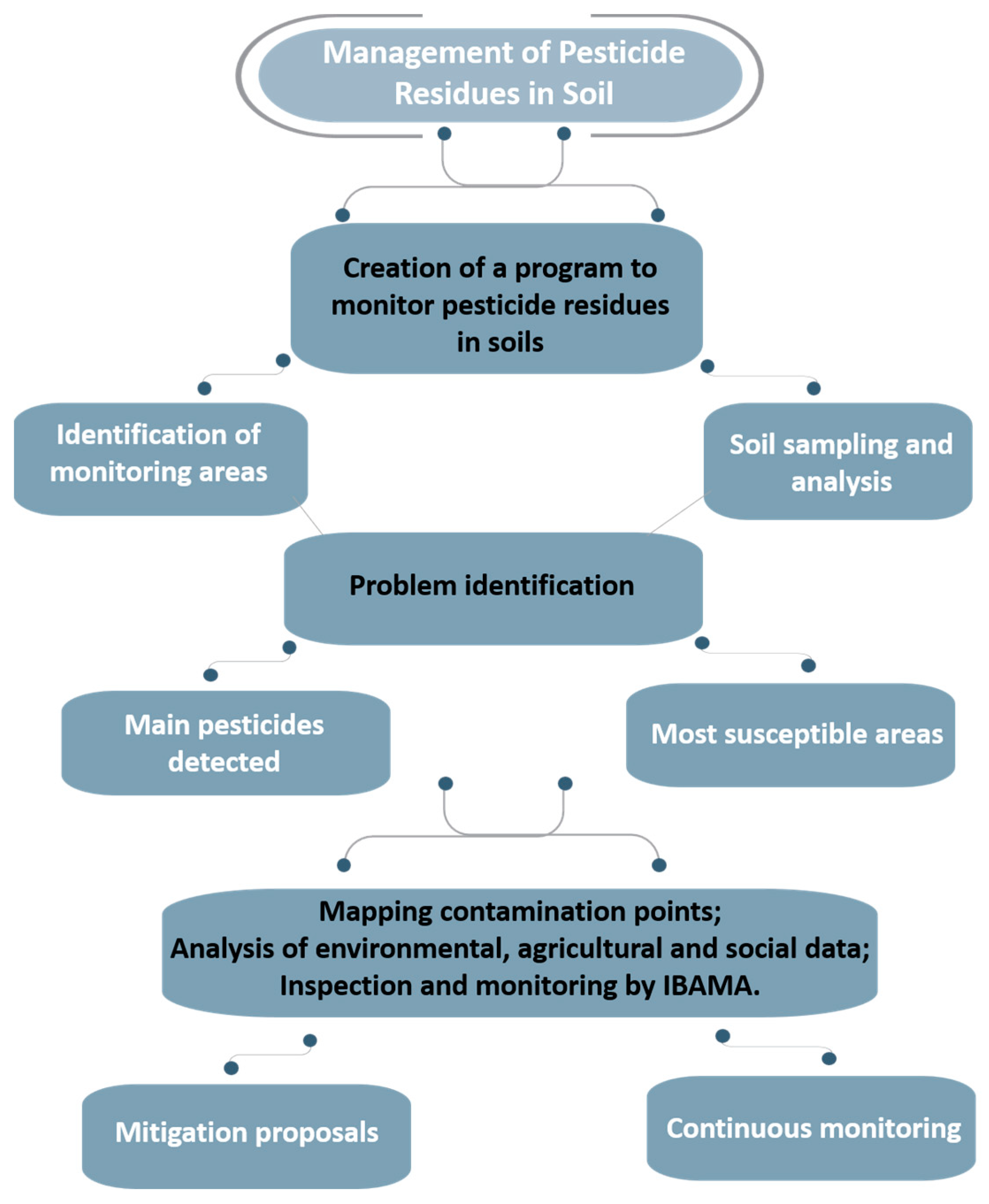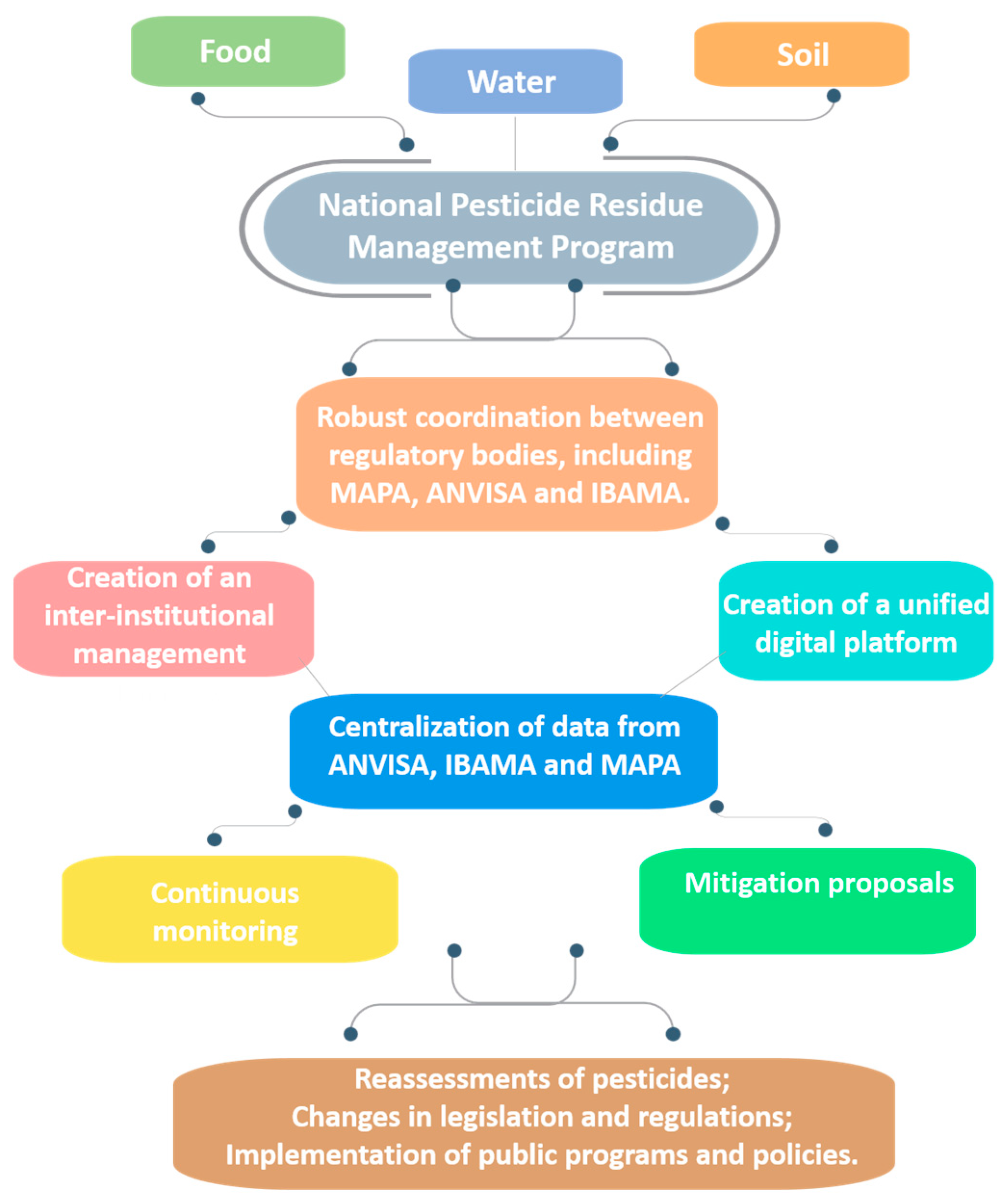Abstract
Brazil is among the four largest global food producers and is a significant consumer of pesticides. However, the current management of pesticide residues in Brazil faces substantial challenges, including fragmented data, limited access to reliable information, and weak inter-institutional coordination. These shortcomings hinder effective monitoring and enforcement. This study evaluates the existing framework for managing pesticide residues in food, water, and soil in Brazil, identifying gaps and proposing strategies for improvement. Key recommendations include the establishment of an inter-institutional steering committee, the development of a unified digital platform for data sharing, and the implementation of a National Pesticide Residue Management Programme (NPRMP). The NPRMP would define measurable targets to reduce contamination in food and the environment, promote sustainable agricultural practices, and enhance the monitoring of pesticide residues. Capacity-building through continuous professional training and public education campaigns is essential to ensure the programme’s successful implementation. Financial resources may be drawn from various sources, including budgetary allocations by the federal government; donations from individuals or legal entities, whether public or private, domestic or international; funds from the National Fund for Scientific and Technological Development (FNDCT); and contributions from the National Environmental Fund. This integrated approach aims to reinforce regulatory mechanisms, safeguard public health, and ensure environmental conservation within the context of Brazil’s expanding agricultural sector.
1. Introduction
Pesticide residue management presents a global challenge to public health and environmental preservation, particularly in Brazil. The increasing reliance on chemical inputs within the agricultural sector has heightened concerns regarding contamination of soil, water, and food, as well as the associated adverse effects on human health and ecosystems [1]. It is estimated that approximately 64% of global agricultural land is affected by pesticide contamination, with residues from multiple pesticide compounds present in an estimated 2.5 billion hectares [2,3]. Brazil is among the world’s leading pesticide consumers, having applied an estimated 719,507 tonnes in 2021, corresponding to an average of 10.9 kg per hectare [4].
The decentralization of data and limited access to relevant information concerning the use and disposal of pesticides further exacerbate these challenges, hampering the development of effective policies and comprehensive monitoring systems. The absence of an integrated management framework and a lack of transparency in data dissemination constitute major obstacles to the efficient control of pesticide residues. While some data on residues in food and water are available through governmental monitoring programs, comparable information on soil contamination is notably scarce. Although various non-governmental organizations (NGOs) are active in environmental advocacy, relatively few prioritize toxic chemical pollution, contributing to a general lack of detailed, site-specific data on contamination levels.
In response to these challenges, the Brazilian government recently enacted Law No. 14.785/2023, marking a significant step forward in transforming pesticide waste management nationwide [5]. This legislation introduces two foundational systems: the Unified System for Registration and Use of Pesticides and Environmental Control Products and the Unified System for Information, Petition, and Electronic Assessment (Sispa) [5]. These systems are intended to centralize and integrate data on pesticide usage and disposal, thereby enhancing coordination among key regulatory bodies such as the Ministry of Agriculture and Livestock (MAPA), the National Health Surveillance Agency (ANVISA), and the Brazilian Institute of Environment and Renewable Natural Resources (IBAMA).
The integrated and systematic approach outlined in the new legislation constitutes a substantial advance in Brazil’s pesticide residue management framework [5]. Effective inter-agency coordination, supported by digital technologies for monitoring and evaluation, will be crucial to ensuring food safety, environmental conservation, and public health.
Accordingly, this study undertakes a comprehensive analysis of pesticide residue management across food, water, and soil in Brazil and proposes targeted measures to enhance the efficiency and efficacy of this management system.
2. Methods
A systematic assessment of pesticide residue data in food, soil, and water was conducted. Data on food contamination were obtained from the National Plan for the Control of Residues and Contaminants in Animal Products (PNCRC/Animal) and the Pesticide Residue Analysis Program in Food (PARA). For water contamination, data were sourced from the National Program for the Monitoring of Drinking Water Quality (VIGIAGUA). Soil contamination by pesticides was examined through a systematic literature review using major scientific databases, including Web of Science, SciELO, ScienceDirect, and Google Scholar.
The PARA data correspond to the 2017–2022 multi-year plan, while the PNCRC/Animal data refer to the year 2023. VIGIAGUA data represent the most recent records available at the time of the research for each Brazilian state, as follows: Alagoas (AL)—2022, Bahia (BA)—2022, Ceará (CE)—2022, Maranhão (MA)—2022, Paraíba (PB)—2015, Pernambuco (PE)—2022, Piauí (PI)—2022, Rio Grande do Norte (RN)—2022, Sergipe (SE)—2022, Acre (AC)—2022, Amazonas (AM)—2021, Pará (PA)—2022, Rondônia (RO)—2015, Roraima (RR)—2015, Tocantins (TO)—2022, Espírito Santo (ES)—2022, Minas Gerais (MG)—2022, Rio de Janeiro (RJ)—2022, São Paulo (SP)—2022, Federal District (DF)—2022, Goiás (GO)—2022, Mato Grosso do Sul (MS)—2022, Mato Grosso (MT)—2022, Paraná (PR)—2022, Rio Grande do Sul (RS)—2022, and Santa Catarina (SC)—2022. No data on pesticide residues in water were available for the state of Amapá (AP).
The data were analyzed descriptively using Microsoft Excel (Version 16.0.4266.1003, Microsoft Corporation, Redmond, WA, USA) for organization, categorization, and processing. Geographic maps were generated using ArcGIS software (Version 10.1, ESRI, Redlands, CA, USA).
3. Analysis and Diagnosis
Brazil is one of the largest food producers in the world (FAO, 2022) [6], and to sustain high levels of agricultural productivity, the widespread use of pesticides is essential for the control of pests, diseases, and weeds. Consequently, the country is recognized as one of the world’s leading consumers of these chemical agents [6]. Pesticide residue management differs substantially across major food-producing nations. In Brazil, despite recent legislative progress—such as the enactment of Law No. 14.785/2023—the system remains fragmented, characterized by limited transparency in real-time data and inconsistent enforcement capabilities across regions. By contrast, the United States operates under a centralized framework led by agencies such as the Environmental Protection Agency (EPA) and the U.S. Department of Agriculture (USDA), which maintain public databases, conduct systematic residue monitoring, and rely on a robust analytical infrastructure [7,8]. China has adopted advanced technologies, including artificial intelligence and incentives for biopesticide adoption, although enforcement remains problematic in rural areas [9,10]. India faces similar enforcement challenges but has prioritized educational initiatives and monitoring practices tailored to meet export requirements [11,12]. Harmonizing Brazil’s regulatory practices with international benchmarks may enhance its capacity to govern pesticide residues effectively, thereby improving food safety and public health outcomes.
In recent years, there has been a marked increase in pesticide use across Brazil, largely associated with the expansion of cultivated land and the advancement of agricultural frontiers. From 2009 to 2022, the total volume of pesticide sales more than doubled, increasing from 306,785.10 to 800,652.17 tons per year [13]. Among the classes of the pesticides used, herbicides account for the highest proportion (61.49%), followed by fungicides (16.05%), insecticides (11.09%), and other categories (11.37%) [13]. The ten states with the highest levels of pesticide consumption are Mato Grosso (22.07%), São Paulo (12.46%), Paraná (9.96%), Goiás (8.15%), Rio Grande do Sul (8.11%), Minas Gerais (6.77%), Mato Grosso do Sul (6.09%), Bahia (4.86%), Tocantins (2.20%), and Pará (1.95%), with the remaining states and undefined regions accounting for 17.38% of national consumption [13]. The ten most widely marketed active ingredients in Brazil include glyphosate, 2,4-D, atrazine, mancozeb, chlorothalonil, acephate, diquat, chlorpyrifos, methomyl, and malathion [13].
Brazil’s agricultural sector produces a wide range of foodstuffs and agribusiness commodities. In 2022, the most extensive areas planted or prepared for harvest were allocated for soybeans (41,141,725 ha), maize (21,284,279 ha), wheat (3,167,615 ha), beans (2,714,611 ha), and cotton (1,648,928 ha) [14]. In terms of pesticide consumption by crop, soybeans accounted for the highest share (54%), followed by maize (18%), cotton (7%), pasture (6%), and sugarcane (4%) [15]. Although certain crops occupy smaller cultivated areas, they exhibit high pesticide application rates per hectare. Notably, tomatoes (52.5 kg/ha), potatoes (28.8 kg/ha), citrus (12.4 kg/ha), cotton (5.9 kg/ha), and coffee (4.2 kg/ha) demonstrate the highest pesticide use intensity [15]. These crops tend to be more vulnerable to pests and diseases and typically represent high economic value.
To commercialize pesticides in Brazil, manufacturers are required to register their products with MAPA, in accordance with the provisions of Law No. 14.785 of 27 December 2023 [5]. The registration process mandates comprehensive toxicological assessments concerning human health and environmental safety. Products that present unacceptable risk levels are not approved for use within the country [5]. Despite the rigor of Brazilian legislation concerning pesticide production and authorization, numerous reports of poisoning incidents continue to be recorded.
The Codex Alimentarius, a joint initiative of the Food and Agriculture Organization (FAO) and the World Health Organization (WHO), establishes the Maximum Residue Limits (MRLs) for pesticides in agricultural products [16]. However, individual countries may adopt or adapt these MRLs in accordance with national regulatory frameworks [16]. In Brazil, MRLs are not directly imposed by the Codex but are defined by ANVISA, which considers Codex recommendations guidelines, particularly in the absence of pre-established national limits [16]. The establishment of MRLs by Anvisa takes into account factors such as the Acceptable Daily Intake (ADI), estimated consumer exposure levels, and adherence to Good Agricultural Practices (GAPs) [16].
The intensive use of pesticides in Brazil raises serious concerns regarding the presence of chemical residues in food, water, and the broader environment. These substances may persist in the food supply, posing potential risks to human health [17]. Additionally, pesticides can infiltrate water bodies, compromising drinking water quality and disrupting aquatic ecosystems [17]. They may also remain in the soil, adversely affecting biodiversity and altering local fauna and flora [17].
Given the expanding scale of agriculture and the concomitant rise in pesticide usage, the development of robust public policies and the adoption of more sustainable agricultural practices are imperative to mitigate these negative impacts and safeguard both food security and environmental integrity. In this regard, farmers are encouraged to implement alternative strategies such as biological pest control, integrated production systems, and cultural, mechanical, and physical control methods to reduce reliance on chemical pesticides.
3.1. Pesticide Residues in Food
In Brazil, the primary programs for monitoring pesticides in food are the National Plan for Residue and Contaminant Control/Animal (PNCRC/Animal) and the Pesticide Residue Analysis Program in Food (PARA), under the responsibility of MAPA and ANVISA, respectively.
The PNCRC/Animal is a risk management tool implemented by MAPA to ensure the chemical safety of foods of animal origin produced in Brazil [18]. The program encompasses annual sampling and analytical plans targeting eggs, milk, honey, and animals destined for slaughter in establishments under federal inspection [18]. The analyses cover a wide range of substances, including pesticides [18].
The planning and implementation of the PNCRC/Animal are coordinated by various administrative units within the Secretariat of Agricultural Defense (SDA/MAPA), including the Department of Inspection of Products of Animal Origin (DIPOA), the Department of Inspection of Livestock Inputs (DFIP), the General Coordination of Laboratory Support (CGAL), and the General Coordination of Intelligence and Strategy (CGIE) [18].
The Federal Inspection Service collects samples from batches of animals and products originating from a single source, enabling traceability to the rural property of origin [18]. In the event of a violation of the established limits, specific subprograms are initiated to investigate the rural property of origin, identify the cause of non-compliance, apply possible administrative sanctions if necessary, and mitigate the risk of recurrence [18].
MAPA released the most recent PNCRC/Animal results in 2023, with pesticide residue monitoring conducted using multi-residue and multi-assay analysis methods [18]. Multi-residue analysis enables the detection of various types of pesticides (insecticides, herbicides, fungicides, etc.) in a single food sample, commonly using chromatography techniques. Multi-assay analysis involves the application of multiple analytical procedures to simultaneously identify multiple pesticide classes, such as organophosphates, carbamates, and pyrethroids.
The laboratory performed under the PNCRC/Animal program primarily employs chromatographic techniques coupled with mass spectrometry, including liquid chromatography—tandem mass spectrometry (LC-MS/MS) and gas chromatography—mass spectrometry (GC-MS/MS) [18]. These methods are highly sensitive and selective, enabling the detection and quantification of residues at levels as low as parts per billion (ppb) or below, with detection limits often below 1.0 µg/kg [18]. The methods are validated according to international standards, with recovery rates ranging from 70% to 120%, precision below 15%, and the capacity for multi-residue analysis in complex matrices such as milk, meat, eggs, honey, and fish [18]. These analytical capabilities ensure the reliability of results for sanitary surveillance and compliance with international trade requirements [18].
Sampling under the PNCRC/Animal program is conducted annually according to a sampling plan developed by MAPA, which considers criteria such as production volume, historical non-compliance, the risk profile of specific substances, and importing market requirements [18]. Samples are randomly selected and stratified across federally inspected establishments, rural properties, and distribution centers, representing various regions and production systems [18]. Official agents carry the collection following standardized protocols for sample quantity, preservation, and traceability, thereby ensuring the representativeness and integrity of samples for laboratory analysis [18].
In the latest report published in 2023, non-compliance was observed in eggs and milk, with 1.52% and 1.18% of the samples, respectively, containing pesticide residues [19]. The egg sample exhibited elevated levels of fipronil, and the milk sample contained chlorpyrifos, both of which are insecticides [19]. Other products analyzed—such as poultry, cattle, horses, honey, farmed fish, and pigs—were compliant, with residues below the established thresholds [19].
The PNCRC/Animal program demonstrates a high degree of analytical rigor through the use of modern, internationally validated chromatographic methods that offer both sensitivity and precision. This enables effective traceability in cases of non-conformity and plays a vital role in maintaining the confidence of international markets that import Brazilian animal products.
In Brazil, the National Program for the Control of Residues and Contaminants/Vegetal (PNCRC/Vegetal) and the Program for the Analysis of Pesticide Residues in Food (PARA) monitor pesticide residues in plant-based foods.
According to the most recent report from PNCRC/Vegetal, issued in 2020, 853 samples were analyzed in the states of Alagoas (AL), Amazonas (AM), Ceará (CE), Distrito Federal (DF), Maranhão (MA), Minas Gerais (MG), Mato Grosso do Sul (MS), Mato Grosso (MT), Paraíba (PB), Pernambuco (PE), Paraná (PR), Rio Grande do Norte (RN), Rio Grande do Sul (RS), Santa Catarina (SC), Sergipe (SE), São Paulo (SP), and Tocantins (TO) [20]. Of these samples, 82.41% were compliant, while 17.59% were non-compliant [20]. Twelve food products were evaluated, namely rice, citrus fruits, potatoes, wheat flour, bananas, grapes, carrots, pineapples, tomatoes, beans (Phaseolus vulgaris), bell peppers, and beans (Vigna unguiculata) [20]. Among these, bell peppers and Vigna unguiculata beans showed the compliance rates, with 36.25% and 23.33%, respectively [20]. The PNCRC/Vegetal report does not provide specific details on the types of non-compliant pesticides or the crops in which they were found.
PARA is coordinated by ANVISA, in conjunction with state and municipal health surveillance agencies and state public health laboratories [16]. ANVISA incorporates PARA into its strategic planning as a crucial post-marketing surveillance mechanism due to its broad scope, its representativeness of Brazilian dietary habits, and its contribution to food safety [16]. The principal program aim of PARA is to monitor pesticide residues in foods of plant origin and mitigate the health risks associated with dietary exposure to these substances. This is achieved by identifying irregularities and assessing health risks based on the results obtained from collected samples [16].
PARA’s activities operate nationwide and are structured to collect plant-based foods from retail markets across all Federative Units (UFs) of Brazil [16]. ANVISA evaluates the analytical results, maps the distribution of pesticide residues in food, and implements mitigating measures in cases of irregularities or potential health risks [16]. Thus, the program contributes to food safety, informs production chains about non-conformities in their practices, and promotes the adoption of good agricultural practices.
One of the key stages in ANVISA’s evaluation process is the dietary risk assessment, which examines the likelihood of adverse health effects arising from the ingesting of food containing pesticide residues [16]. This assessment determines parameters such as the Acute Reference Dose (ARD), Acceptable Daily Intake (ADI), and Maximum Residue Limit (MRL) [16]. The MRL refers to the maximum allowable concentration of pesticide residues in food, resulting from proper pesticide use, and is expressed in milligrams per kilogram [16] of food. Collections are conducted weekly, and monitoring activities assess whether pesticide application complies with good agricultural practices [16].
The PARA sampling design is based on technical-epidemiological criteria, which consider consumption frequency, contamination risk, and geographic representativeness of the analyzed foods [16]. Samples are collected from the retail outlets in various Brazilian states, prioritizing fresh plant products with high circulation. Laboratory analyses are performed by accredited public institutions using techniques such as liquid or gas chromatography coupled with mass spectrometry (LC-MS/MS or GC-MS/MS), which provide high sensitivity and specificity [16]. The detection limit (DL) in these analytical methods corresponds to the lowest concentration of residues that can be reliably detected and is crucial for identifying even minimal levels of pesticide residues, in accordance with MRLs set by Brazilian legislation [16].
During the 2017–2022 multi-year plan, 36 food items were analyzed in three annual cycles, representing approximately 80% of the plant-based foods consumed by the Brazilian population [21]. In the 2018–2019 cycle, 14 food items were analyzed, with 3296 samples collected and 272 pesticides investigated across 84 municipalities and 26 states [21]. In the 2022 cycle, 13 food items were analyzed, with 1772 samples collected and 311 pesticides examined in 79 municipalities and 25 states [21].
In the 2018–2019 cycle, 74.4% of samples were deemed satisfactory—33.2% contained no residues, and 41.2% contained residues within permissible limits. Non-compliant samples accounted for 25.6% [21], with 21.1% involving residues of unauthorized pesticides for the crop, 2.4% exceeding the MRL, 0.49% involving banned substances, 0.06% with unregistered products, and 1.5% presenting more than one non-conformity [21]. Concerning active ingredients banned or not approved for use in Brazil, 21 samples (0.6% of the 3296 analyzed) contained such residues, including carbofuran (16 samples), methamidophos (1), prochloraz (3), and triforine (1) [21]. Carbofuran residues were detected in orange (8 samples), papaya (6), cucumber (1), and grape (1) [21]. Although banned in Brazil since 2017, the presence of carbofuran may be due to the use of carbosulfan, still authorized for crops such as cotton, sugarcane, eucalyptus, tobacco, corn, and soybean [21].
In the 2022 cycle, 75% of the samples were considered satisfactory, with 41.1% showing no residues and 33.9% showing residues within acceptable limits; 25% were non-compliant [21]. Among the non-conformities, 15% were residues of products not permitted for the crop, 4% were residues above the maximum permissible limit, 0.06% were residues of products prohibited in Brazil, 0.3% were residues of unregistered products, and 5.66% had more than one non-conformity [21]. One orange sample presented carbofuran residue (0.1% of the 1772 samples analyzed) regarding the active ingredients prohibited or for unauthorized use in Brazil [21]. In addition, one strawberry sample presented fenthione residues (0.1% of the 1772 samples analyzed) [21]. Regarding active ingredients never evaluated in Brazil, six samples (0.3%) presented residues under these conditions, detecting chlorpyrifos-methyl, for which no products are registered in the country [21].
If a pesticide residue is found in a food at a concentration equal to or below the MRL, the food is considered safe for the consumers with respect to that specific [21]. The MRL is an agronomic parameter derived from field studies that simulate the correct use of a pesticide [21]. It serves as a food safety reference concerning the presence of pesticide residues and is an integral part of exposure and dietary risk assessments conducted prior to pesticide registration or the authorizing of new crop uses [21]. When residues exceed the MRL or originate from unauthorized use, a specific evaluation is required [21]. This assessment compares the expected exposure with acute (ARD) and chronic (ADI) toxicological thresholds. If the exposure surpasses these thresholds, there is a potential risk to consumer health [21].
In 21 samples, a potential acute risk to consumers was identified—18 from the 2018–2019 cycle and three from the 2022 cycle [21]. This assessment compares the expected exposure with acute (ARD) and chronic (ADI) toxicological thresholds. If the exposure surpasses these thresholds, there is a potential risk to consumer health [21].
Orange was the product that presented the highest percentage of samples exceeding the ARD [21]. Most exceedances were associated with carbosulfan and its metabolite carbofuran [21]. However, the percentage of orange samples posing a potential acute risk declined between 2013 and 2022 [21]. Notably, in 2017, the use of carbofuran was banned, and carbosulfan was removed from authorized citrus crops [21].
The results of PARA are instrumental in guiding actions such as the toxicological re-evaluation of pesticides, enhancement of food traceability, establishment of restrictions on registered products, improvements of pesticide registration for crops lacking sufficient phytosanitary support, capacity building, and strengthening of the National Health Surveillance System [21]. Moreover, the program has shown steady progress, evidenced by an increase in the number of monitored crops and pesticides, a reduction in potential acute risk rates, the establishment of new institutional partnerships, and improved logistics in assessments [21]. Therefore, PARA can be regarded as an effective and highly relevant initiative for the prevention of human health issues related to pesticide contamination in food.
However, the data provided by PNCRC and PARA do not include information on production sites, hindering a more detailed analysis of the origin of non-compliant foods. Available data only indicate the type of food and the number and percentage of non-compliant samples. A proposed improvement to these programs would involve more detailed and transparent data disclosure, including information on the origin and date of sample collection. For vegetables, for instance, traceability mechanisms could be implemented throughout the production chain, as outlined by the Joint Normative Instruction ANVISA-MAPA No. 02 of 7 February 2018 [22]. This regulation establishes procedures for applying traceability systems across the entire supply chain of fresh vegetables intended for human consumption, aiming to monitor and control pesticide residues nationwide [22]. It encompasses all stages—from field practices to the marketing—ensuring compliance with national food safety standards. The required information covers product origin (producer identity, location, and production methods); applied substances (which pesticides, when, and in what quantity); transport and storage conditions; and commercialization details (vendor and purchaser). The availability of such data would enable mapping of regions with the highest rates of non-compliance and analysis of their environmental, agronomic, and social characteristics. This would, in turn, support collaborative investigations by institutions such as MAPA, ANVISA, and IBAMA, and research bodies, enabling the formulation of more efficient management strategies.
The graphic summary for the food residue analysis management program is shown in the figure below (Figure 1).
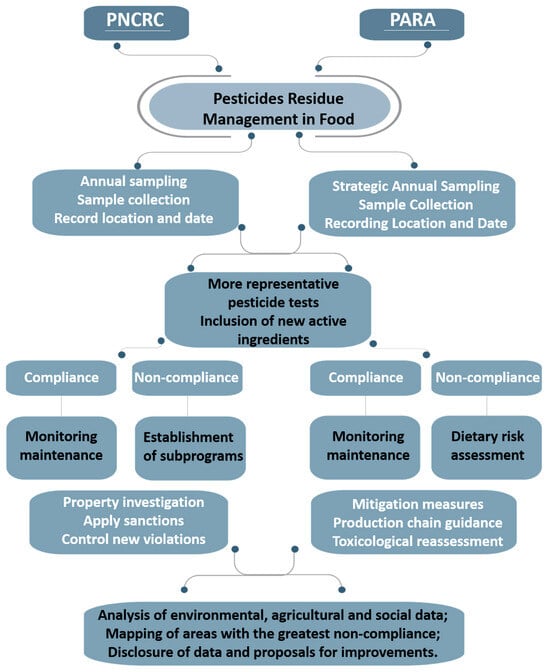
Figure 1.
Graphic summary for pesticide residue management in food with proposals for improvements.
3.2. Pesticide Residues in Water
The monitoring of pesticide residues in water in Brazil is primarily conducted through the National Program for the Monitoring of Quality of Water for Human Consumption (VIGIAGUA). This program comprises a series of measures continuously implemented by public health authorities across various areas of activity, aiming to ensure that the population has access to water in adequate quantities and of a quality consistent with the potability standards established by current legislation [23].
The Information System for Monitoring the Quality of Water for Human Consumption (SISAGUA) is a VIGIAGUA tool designed to support health risk management. It utilizes data routinely generated by Health Surveillance professionals and those responsible for water supply services [23]. This system enables the generation of information regarding water quality, including the presence of pesticides, thereby facilitating planning, decision-making, and the implementation of health-related actions concerning water intended for human consumption.
VIGIAGUA monitors the presence of 27 pesticides in drinking water, specifically: 2,4-D + 2,4,5-T, alachlor, aldicarb + aldicarbesulfone + aldicarbesulfoxide, aldrin + dieldrin, atrazine, carbendazim + benomyl, carbofuran, chlordane, chlorpyrifos + chlorpyrifos-oxon, DDT + DDD + DDE, diuron, endosulfan, endrin, glyphosate + AMPA, lindane (gamma HCH), mancozeb, methamidophos, metolachloro, molinate, methyl parathion, pendimentalin, permethrin, profenofos, simazine, tebuconazole, terbufos, and trifluralin [23]. SISAGUA contains data from 3930 Brazilian municipalities, but although the program recommends biannual analyses, data has been absent for some years in several Brazilian states [24].
Pesticide residues are quantified at water treatment plants in several Brazilian cities, and the results are categorized as detections with values either above or below the Maximum Permitted Value (MPV) [23]. The MPV is the concentration deemed safe for human health. The highest frequencies of pesticide residues detected below the MPV were observed in the states of Acre, Amazonas, Bahia, Piauí, and Sergipe, where over 74% of the samples tested positive for pesticide residues in water intended for human consumption (Figure 2A). Among these, only Bahia ranks among the ten states with the highest pesticide consumption. This suggests that issues related to the presence of pesticide residue in water may not be solely attributed to the volume of product used but may also involve factors such as improper application techniques, insufficient monitoring, or the physicochemical characteristics of the most commonly used products.
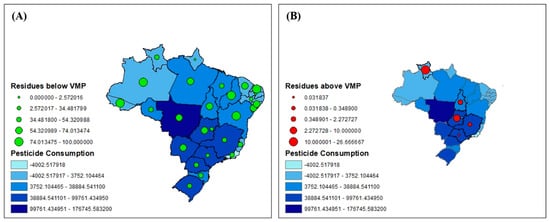
Figure 2.
Pesticide consumption by Brazilian state (in tonnes of active ingredient) and detection of pesticide residues in water, expressed as the percentage of residues found below (A) and above (B) the Maximum Permitted Value (MPV). The negative value, related to the state of Rio de Janeiro (RJ), indicates the volume of pesticide returned due to non-use. Data sources: IBAMA (2024) [25]; VIGIAGUA (2024) [23].
Regarding the detection of pesticide residues in water above the MVP, only five states were reported to have such occurrences: Roraima, Goiás, Tocantins, Minas Gerais, and São Paulo (Figure 2B). Notably, Goiás, Tocantins, Minas Gerais, and São Paulo are among the ten states with the highest pesticide consumption. In this context, higher consumption may be associated with an increased occurrence of residues exceeding the permitted limits.
The highest frequencies of pesticide detections in water—both at concentrations above and below the MPV—were as follows: alachlor in the North region (3007 detections), aldrin + dieldrin in the Northeast region (2016 detections), aldrin + dieldrin in the Southeast region (28,813 detections), DDT + DDD + DDE in the Central-West region (2370 detections), and aldrin + dieldrin in the South region (18,707 detections) (Table 1). None of these compounds are among the ten most consumed pesticides in Brazil; however, most are highly persistent in the environment. The half-lives of aldrin and dieldrin are long—both are organophosphate insecticides—with aldrin persisting for up to seven years [26]. DDD can persist for up to ten years, and DDT for up to fifteen years [26]. With the exception of alachlor, all the aforementioned pesticides are banned in Brazil, however, due to their environmental persistence, they continue to be detected, particularly in water sources.

Table 1.
Number of pesticide residue detections in drinking water in Brazilian states, classified as either above or below the Maximum Permitted Value (MPV). Data source: VIGIAGUA, 2024 [23].
One of the limitations of assessing water quality based solely on MVPs is the disregard for the potential synergistic effects of multiple pesticide residues. Several municipalities, particularly in São Paulo, report the presence of more than one pesticide in drinking water [23]. Nevertheless, even if all 27 monitored pesticides are present at concentrations below their respective MPV, the water is considered safe for consumption under current regulations. Furthermore, 20 of the 27 pesticides monitored by the program are classified as highly hazardous by the “Pesticide Action Network International (PAN)” a coalition of non-governmental organizations that monitors the global impact of pesticide use [27].
The data provided by SISAGUA seldom include information on water treatment facilities. One potential improvement in the monitoring of pesticide residues in water would be the mapping and public disclosure of water collection points. Access to such data would enable the identification of potential sources of contamination and support the development of targeted mitigation strategies. A comprehensive analysis of the environmental, agrarian, and social characteristics of each region is essential for the effective management of pesticide residues in water. Furthermore, such data would facilitate integrated studies by agencies such as MAPA, ANVISA, and IBAMA.
A summary for the water residue analysis management program is presented in the figure below (Figure 3).
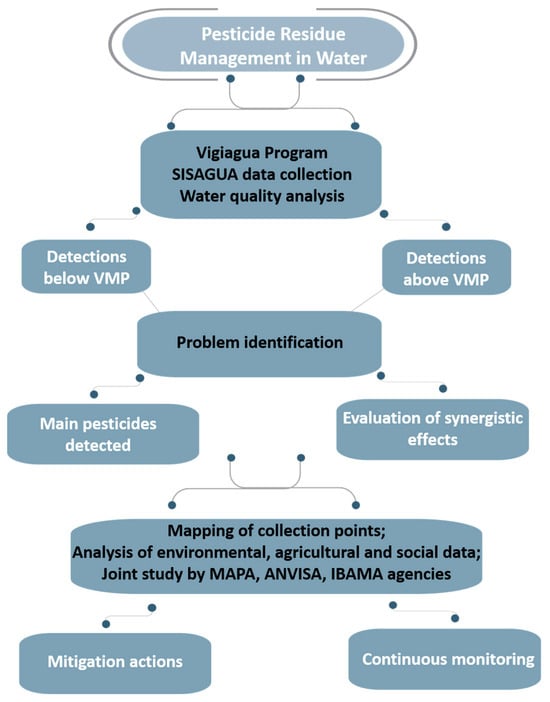
Figure 3.
Graphic summary for pesticide residue management in water with proposed improvements.
3.3. Pesticide Residues in the Soil
Soil monitoring is less effective than food and water monitoring, and information is scarcer in national databases. This may be due to the greater difficulty regulatory agencies face in obtaining soil samples for monitoring. Some national programs for sustainable soil and watershed management include the National Program for Soil Interpretation Surveys in Brazil and the National Program for Sustainable Soil and Water Management in Micro-Watersheds. However, none have identified critical contamination points or proposed mitigation measures.
Brazil has a vast area of land cultivated with pesticide-treated crops, and although it has already been identified as a hotspot for pesticide contamination [28], the identification of contamination points and the management of residues remain topics primarily addressed by academic research institutions. The results of such research are disseminated independently by various studies that identify locations of pesticide contamination, since no consolidated data is available online from national or state systems [29,30,31].
One of the most recent reviews evaluated approximately 220 soil samples, identifying approximately 55 types of pesticides in the soils between 1995 and 2018 [30]. Among the pesticides detected, 46% were insecticides, 29% were fungicides, 23% were herbicides, and 2% were acaricides [30]. Furthermore, most of the pesticides identified (58%) belonged to the organochlorine chemical class [30]. The study covered only 46% of the Brazilian states: Amazonas, Bahia, Maranhão, Mato Grosso, Minas Gerais, Pará, Paraná, Rondônia, Rio de Janeiro, Rio Grande do Sul, Santa Catarina, and São Paulo [30]. The highest pesticide concentrations were reported in Pará, Rio de Janeiro, and Paraná [30]. In agricultural soils, higher concentrations of pesticides such as trifluralin, alachlor, endosulfan alpha and beta, and aldrin were observed [30]. In residential soils, higher concentrations of DDT and HCH, along with their respective metabolites, were found [30]. Notably, pesticide concentrations in residential soils were higher than in agricultural soils [30].
The half-life of pesticides in soil is an important attribute to consider, as it reflects the duration of potential exposure risk. It is estimated that pesticide residues in approximately 1.88 million km2 of agricultural land exceeded 1 mg kg−1 of soil for more than 180 days a year. These regions are predominantly located mainly in China (0.83 million km2), Brazil (0.23 million km2) and the United States (0.17 million km2) [28].
The greatest concern regarding pesticide residues in the soil arises in areas with extensive cultivation of crops such as soybeans, corn, wheat, beans, and cotton—the most widely planted species in Brazil. The map below illustrates the total area planted with these crops by state (Figure 4). Coincidentally, the highest levels of pesticide consumption are also observed in the regions with the largest planted areas (Figure 4). This is expected, as large-scale agricultural production typically requires more intensive pesticide use to control pests, diseases, and weeds. Therefore, in these areas, more rigorous soil monitoring is essential to prevent environmental contamination.
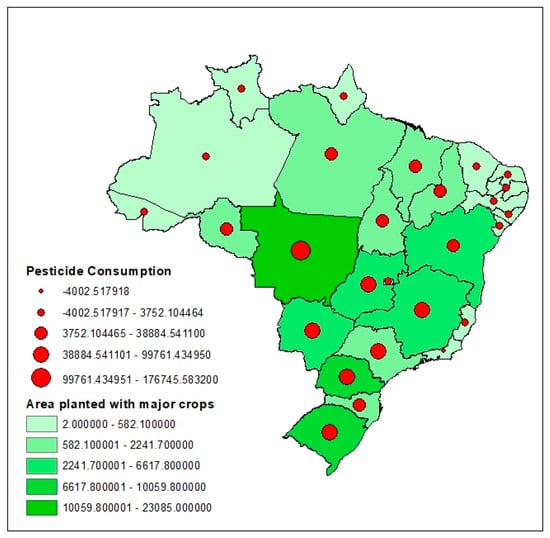
Figure 4.
Sum of the area planted with soybeans, corn, wheat, beans, and cotton and total pesticide consumption by Brazilian state for the 2022/2023 harvest. Map prepared by the author based on data from CONAB (2024) [32] and IBAMA (2022) [25].
The absence of unified data on contamination sites, pesticide concentrations, and identified compounds hinders the proposal and implementation of effective monitoring and mitigation strategies for pesticide residues in Brazilian soils. Furthermore, estimations of half-lives tend to be inaccurate due to Brazil’s vast territorial extension, which encompasses a wide diversity of soil and climatic conditions.
Following the example of VIGIAGUA, a similar initiative could be developed to monitor soil quality. This program would include the detection of pesticide residues at strategic points, such as agricultural areas and natural ecosystems adjacent to production zones. Based on such data, mitigation plans could be drawn up, for instance, the implementation of buffer zones or green areas planted with phytoremediation species aimed at reducing pesticide residues in the soil and preventing their leaching into water bodies. Additionally, the program could enhance surveillance in areas of greater contamination and identify region-specific environmental and agronomic challenges.
The graphic summary of the proposed food residue analysis management program is presented in the figure below (Figure 5).
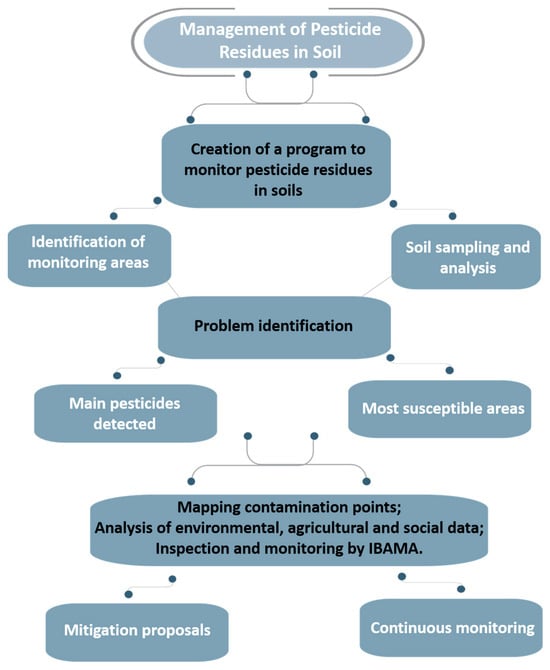
Figure 5.
Graphic summary for pesticide residues in soil with proposed improvements.
4. Unified Management Proposal
The implementation of a unified pesticide residue management system in Brazil faces substantial bureaucratic, financial, and technical challenges. Institutional fragmentation among regulatory agencies, lack of standardized regulations, and limited data sharing hinder the coordination of integrated actions. From a financial perspective, high costs associated with laboratory analyses, maintenance of technological infrastructure, and unequal resource distribution across regions represent critical barriers. Technically, obstacles include limited traceability coverage throughout the production chain, restricted analytical capacity in public laboratories, and the absence of a national, real-time digital monitoring system. These factors compromise the effectiveness of residue control policies and underscore the need for coordinated efforts to overcome them.
The data presented for analysis and diagnosis clearly indicate how decentralization and difficulty in accessing information constitute major obstacles to the management and mitigation of pesticide residues. In Brazil, while numerous non-governmental organizations (NGOs) address environmental issues, only a few focus specifically on toxic chemical substances such as pesticides. Notable examples include the Associação de Combates aos Poluentes (ACPO), the Associação de Trabalhadores Expostos a Produtos Químicos (ATESQ), the Rede de Ação sobre Agrotóxicos e suas Alternativas na América Latina (RAPAL), the Associação para a Proteção do Meio Ambiente de Cianorte (APROMAQ), and the Toxisphera (Environmental Health Association). However, none of these organizations provide comprehensive data or public reports on contamination sites related to pesticide residues.
In this context, Brazil’s unified management of pesticide residues is proposed under Law No. 14.785 of 27 December 2023. Articles 22 and 58 of this law establish the Unified System for the Registration and Use of Pesticides and Environmental Control Products and the Unified System for Information, Petition, and Electronic Evaluation [5].
According to Law No. 14.785/2023, the Unified System for the Registration and Use of Pesticides and Computerized Environmental Control Products will fall under the responsibility of the registering agencies [5]. MAPA, ANVISA, and IBAMA will be the agencies responsible for implementing, maintaining, and updating the system within their respective remits [5]. This requires collaboration to ensure data synchronization and consistency in the application of regulatory guidelines.
The system must include all entities involved in the pesticide chain, such as producers, handlers, importers, exporters, research institutions, distributors, qualified professionals, farmers, and service providers [5]. This comprehensive registry ensures oversight and regulation of all relevant stakeholders.
Data for the system must be captured electronically via agronomic prescriptions, to be completed by legally qualified professionals [5]. This enables real-time monitoring of pesticide use, facilitating the detection of irregularities and the implementation of corrective actions.
The minimum requirements of the Electronic Agronomic Prescription include clear identification of the responsible individual; specification of the crop treated and the corresponding area; geolocation of the application for traceability and control; details of the pesticide used to facilitate the identification of any issues; exact product quantity to ensure compliance with legal limits; application method to verify adherence to best practices; time-stamped records for monitoring and planning purposes; safety guidelines to protect human, animal, and environmental health; and the identification of the technical supervisor, applicator, and end-user, ensuring transparency and accountability [5].
The Unified Electronic Information, Petition and Assessment System (Sispa) aims to: centralize the evaluation of pesticide registrations and amendments, reduncing redundancy and increasing regulatory efficiency; promote transparency by allowing stakeholders to track the progress of applications; streamline the submission and assessment process for registrants; process marketing data to ensure regulatory compliance; protect sensitive information and industrial confidentiality; maintain detailed records of imported, produced, exported, marketed, and non-marketed products for improved market oversight; ensure updated registry of companies and authorized research areas, promoting transparency and traceability; facilitate communication between registrants and agencies through electronic platforms; and enforce mandatory digital submission of all registration-related process [5]. The system is to be developed and implemented within 360 days of the law’s publication, with MAPA responsible for coordinating its development and ensuring compliance with technical and operational requirements [5].
The unified management of pesticide residues in Brazil, as outlined in this new legislation, can be effectively achieved through the creation of integrated systems and interagency coordination between MAPA, ANVISA, and IBAMA. The initiative aims to ensure food safety, environmental protection, and public health while promoting transparency and control over pesticide use across the country. Essential components for the successful implementation of this policy include the development of a unified digital platform, the establishment of a management committee, and the promotion of training programs for all involved parties.
The effectiveness of a unified pesticide residue management system will depend on the establishment of robust mechanisms to ensure enforcement, transparency, and accountability. To guarantee compliance, regulatory agencies must integrate on-site inspections with mandatory use of digital platforms and electronic traceability systems. Preventing data manipulation will require technological safeguards such as secure logins, immutable recordkeeping, and automated information cross-checking. The management of violators should include progressive sanctions, public disclosure of infractions, and collaboration with the Public Prosecutor’s Office in more severe cases. Establishing whistleblower channels and reinforcing accountability mechanisms will be essential to maintaining the system’s integrity.
4.1. Integration Between Systems and Agencies
To ensure effective and integrated management of pesticide residues in Brazil, it is strategic to establish a National Pesticide Residue Management Program, grounded in robust coordination between regulatory agencies, including MAPA, ANVISA, and IBAMA (Figure 6). The creation of an inter-institutional steering committee and the development of a unified digital platform are essential to ensure efficient information exchange and to implement coordinated audit and inspection actions within the program. These initiatives aim to enhance transparency, regulatory compliance, and safety in pesticide use, fostering a more sustainable agricultural environment and contributing to the protection of public health and the environment.
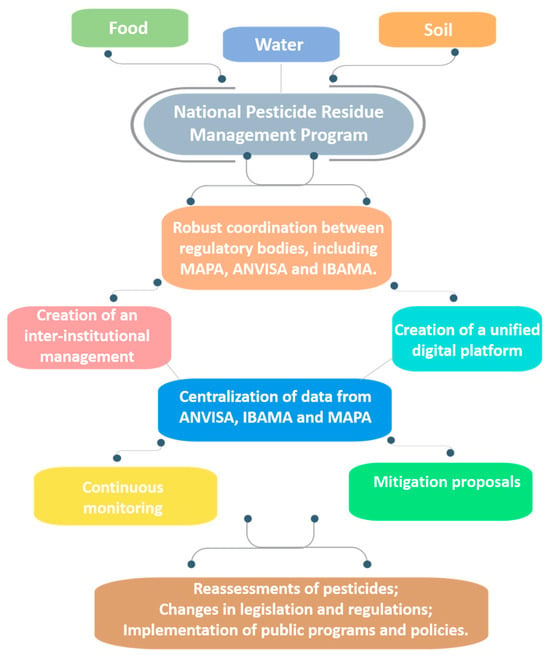
Figure 6.
Graphic summary of the proposal for a National Pesticide Residue Management Program.
4.1.1. About the National Pesticide Residue Management Program
A pesticide residue management program should primarily focus on monitoring and reducing environmental and food contamination, thereby preserving the quality of the environment, food, and water. Accordingly, the main objectives of the program should be to reduce the concentration of pesticide residues in soil, water, and food; encourage adoption of alternative and less hazardous pest control methods; establish an effective system for monitoring the presence of pesticide residues in the environment; update and strengthen legislation and regulations concerning the use and disposal of pesticides; and raise awareness and improve knowledge about the impacts of pesticides and safe management practices.
Specific targets to measure the program’s progress could include: (a) Reviewing and updating pesticide residue legislation by the end of 2025, and introducing new regulations for the safe disposal of pesticide containers by 2025; (b) Implementing pesticide residue monitoring systems across all agricultural regions by 2026, and conducting biannual soil and water analyses in critical areas; (c) Increase the use of biological pesticides by 20% by 2027, and train 70% of farmers in integrated pest management practices by 2026; (d) Reducing pesticide residue concentrations in drinking water by 50% over the next five years, and decreasing pesticide residues in food by 30% by 2028; (e) Legislating the adoption of buffer strips based on a literature review of tolerant species capable of remediating sites with probable pesticide residues; (f) Establishing recommended sequential cropping protocols, including green manures or forage species capable of reducing pre-emergence herbicide residues in agricultural areas; (g) Developing and implementing awareness programs for farmers and the wider community within two years, and conducting annual educational campaigns on pesticide risks for their use and disposal.
To monitor progress towards these goals, performance indicators should be defined, such as concentration of pesticide residues in drinking water (mg/L); percentage of food samples exceeding permitted residue limits; estimated percentage of agricultural and non-agricultural land with pesticide residues; number of farmers trained in integrated pest management; number of new regulations implemented; and scope and reach of awareness campaigns.
Key actions for implementation include introducing buffer zones with phytoremediation species around water bodies to prevent contamination via runoff; promoting agricultural practices that reduce pesticide reliance, such as crop rotation and biological control; subsidizing the cost of biological products to improve affordability for farmers; organizing workshops and training on integrated pest management; encouraging the use of modern monitoring equipment and training personnel accordingly; establishing partnerships with universities and research institutes for routine analyses; and conducting public consultations and workshops to review existing legislation; creating an inter-institutional working group to coordinate new regulation implementation; developing educational materials (e.g., leaflets, videos) on safe pesticide use; collaborating with schools and local communities to disseminate information about pesticide risks.
4.1.2. Interinstitutional Coordination and Collaboration
The establishment of a management committee comprising representatives from MAPA, ANVISA, and IBAMA would be responsible for coordinating the implementation and maintenance of systems, ensuring the integration of data and information between the agencies, monitoring and evaluating the effectiveness of pesticide residue management, and formulating policies and procedures for information exchange and inter-institutional collaboration.
An integrated digital platform should be necessary to unify data from MAPA, ANVISA, and IBAMA—each responsible for agronomic, human health, and environmental assessments, respectively. A centralized interface integrating the Registration System and Sispa would facilitate efficient data sharing among agencies and registration applicants. The platform should include functionalities for document submission, process monitoring, and access to regulatory and market information.
Auditing and inspection, conducted jointly by MAPA, ANVISA, and IBAMA, should involve regular evaluations to ensure compliance with established standards. Audits should include verification of usage records, adherence to agronomic prescriptions, and residue analysis in agricultural products. Based on audit outcomes and digital platform data, annual reports could be published detailing pesticide use and residues detected in food, water, and soil. These reports should be grounded in data collected through the Registration System and Sispa, providing a comprehensive overview of compliance and safety.
With accurate residue diagnostics and monitoring, it becomes possible to identify areas most vulnerable to contamination and direct public policies and government incentives towards environmental and human health protection. Furthermore, ongoing professional training and educational campaigns would enhance the overall efficacy of management efforts.
These initiatives should include training programs for professionals authorized to issue agronomic prescriptions and apply pesticides, alongside outreach campaigns aimed at farmers and companies, focused on best agricultural practices, safe pesticide handling, and regulatory compliance.
4.1.3. Financing and Partnerships
According to article 62 of Law No. 14.785/2023, resources for inspection, promotion of phytosanitary development, and technological innovation in plant health may derive from federal budget allocations earmarked for this purpose; donations from individuals or legal entities, public or private, national or international; resources from the National Fund for Scientific and Technological Development (FNDCT); resources from the National Environmental Fund; or other revenues that may be legally allocated [5]. Feasibility analysis of pilot projects is a critical step for evaluating implementation success, mitigating risks, identifying areas for improvement, and validating assumptions regarding execution, cost, and expected outcomes.
Resources should be allocated to the technical development and instrumentation of pesticide and environmental product analysis and registration areas; development, implementation, and maintenance of Sispa; control and monitoring of phytosanitary products usage; training in phytosanitary management and formation of trainers in phytosanitary activities and rural worker safety; education in environmental control and phytosanitary management; and hiring of ad hoc consultants to support registration analysis of priority products [5].
Therefore, the financial support required to create and maintain the inter-institutional management committee and the unified digital platform may be drawn from the sources mentioned in the law. These resources may also support residue monitoring, inspection activities, and research promotion.
State, municipal, academic, and NGO entities may collaborate to contribute data to the integrated digital platform, following pre-established protocols.
5. Final Considerations
Despite the progress introduced by Law No. 14.785/2023, Brazil’s strategy for pesticide residue management still differs from international best practices. While countries in the European Union and North America implement centralized, digitalized systems with broad public data transparency, Brazil continues to face challenges related to institutional fragmentation, limited analytical capacity, and restricted access to information. Moreover, the definition of specific performance targets and the consolidation of continuous educational programs are more advanced in countries with integrated policies for environmental health, food safety, and participatory governance policies. Aligning Brazil’s strategy with these international benchmarks may significantly strengthen its pesticide residue management system and enhance its alignment with global standards for sustainability and public health protection.
Pesticide residue management in Brazil presents multifaceted challenges. In response, Law No. 14.785/2023 proposes a unified registration and control system for pesticides and environmental control products, along with an integrated electronic platform for data submission, petitions, and evaluations. These measures aim to enhance transparency, improve monitoring, and promote coordination among regulatory agencies such as MAPA, ANVISA, and IBAMA.
Successful implementation of the unified system relies on robust data integration and effective inter-institutional collaboration. Key steps include the establishment of a steering committee with agency representatives and the development of a centralized digital platform to support information exchange and coordinated audit and inspection activities. The proposal also underscores the importance of continuous professional development and public awareness campaigns to promote best practices and regulatory compliance across the production chain.
Moreover, the creation of a National Pesticide Residue Management Program, grounded in defined objectives and measurable performance indicators, offers a practical path towards reducing contamination in food and the environment. Strategic actions, such as the adoption of buffer zones with phytoremediation species, the promotion of less toxic pest control methods, and the implementation of effective residue monitoring systems, are fundamental to achieving these goals. Ensuring the program’s long-term success and sustainability will depend on dedicated funding and strong partnerships with research institutions, non-governmental organizations, and subnational governments.
In conclusion, Law No. 14.785/2023 and the proposed strategies represent a significant step forward in Brazil’s pesticide residue management approach. Strengthened coordination among regulatory bodies, integrated digital infrastructure, and the promotion of safe and sustainable agricultural practices are essential for ensuring food safety, environmental integrity, and public health. Ongoing monitoring, capacity building, and enforcement will be critical to support the effectiveness and resilience of these initiatives.
Author Contributions
Conceptualization, G.M.B. and J.B.d.S.; methodology, G.M.B., M.L.F.L., G.G.S. and H.M.B.; software, T.A.A.P.; validation, T.A.A.P., M.R.d.C., L.M.A., T.M.d.S.T. and J.B.d.S.; formal analysis, G.M.B., M.L.F.L., G.G.S. and H.M.B.; investigation, G.M.B.; resources, J.B.d.S.; data curation, G.M.B., M.L.F.L., G.G.S. and H.M.B.; writing—original draft preparation, G.M.B.; writing—review and editing, G.M.B., T.A.A.P., M.R.d.C., L.M.A., T.M.d.S.T. and J.B.d.S.; visualization, G.M.B., M.L.F.L., G.G.S., H.M.B., T.A.A.P., M.R.d.C., L.M.A., T.M.d.S.T. and J.B.d.S.; supervision, J.B.d.S.; project administration, J.B.d.S.; funding acquisition, J.B.d.S. All authors have read and agreed to the published version of the manuscript.
Funding
This research was funded by “Coordenação de Aperfeiçoamento de Pessoal de Nível Superior (CAPES)”, “Conselho Nacional de Desenvolvimento Científico e Tecnológico (CNPq)”, and “Fundação de Amparo à Pesquisa do Estado de Minas Gerais (FAPEMIG—APQ01151-23, APQ00694-23, APQ004955-23)”.
Data Availability Statement
Data is contained within the article.
Conflicts of Interest
The authors declare that they have no known competing financial interests or personal relationships that could have influenced the work reported in this paper.
References
- Tudi, M.; Daniel Ruan, H.; Wang, L.; Lyu, J.; Sadler, R.; Connell, D.; Chu, C.; Phung, D.T. Agriculture development, pesticide application and its impact on the environment. Int. J. Environ. Res. Public Health 2021, 18, 1112. [Google Scholar] [CrossRef] [PubMed]
- Tang, F.H.; Maggi, F. Pesticide mixtures in soil: A global outlook. Environ. Res. Lett. 2021, 16, 044051. [Google Scholar] [CrossRef]
- Hough, R.L. A world view of pesticides. Nat. Geosci. 2021, 14, 183–184. [Google Scholar] [CrossRef]
- FAOSTAT: Pesticides Indicators. 2022. Available online: https://www.fao.org/faostat/en/#data/RP/visualize (accessed on 14 February 2025).
- Brasil. 2023; Lei nº 14785, de 27 de Dezembro de 2023. “Lei que Dispõe Sobre a Pesquisa, a Experimentação, a Produção, a Embalagem, a Rotulagem, o Transporte, o Armazenamento, a Comercialização, a Utilização, a Importação, a Exportação, o Destino Final dos Resíduos e das Embalagens, o Registro, a Classificação, o Controle, a Inspeção e a Fiscalização de Agrotóxicos, de Produtos de Controle Ambiental, de Seus Produtos Técnicos e afins”. Brasília, Diário Oficial da União de 27 December 2023. Available online: https://www.planalto.gov.br/ccivil_03/_ato2023-2026/2023/lei/l14785.htm (accessed on 14 February 2025).
- FAO: Food and Agriculture Organization of the United Nations. Agricultural Production Statistics 2000–2021; FAOSTAT Analytical Brief Series No. 60; FAO: Rome, Italy, 2022. [Google Scholar] [CrossRef]
- USDA: United States Department of Agriculture. Pesticide Data Program Annual Summary, Calendar Year 2021. 2022. Available online: https://www.ams.usda.gov/pdp (accessed on 22 February 2025).
- FDA: U.S. Food and Drug Administration. Pesticide Residue Monitoring Program Reports. 2022. Available online: https://www.fda.gov/food (accessed on 10 February 2025).
- MARA: Ministry of Agriculture and Rural Affairs of the People’s Republic of China. Annual Report on Agricultural Product Quality and Safety. 2021. Available online: http://www.moa.gov.cn (accessed on 22 February 2025).
- FAO: Food and Agriculture Organization of the United Nations. Pesticide Residues in Food—Codex Alimentarius. 2020. Available online: https://www.fao.org/fao-who-codexalimentarius (accessed on 22 February 2025).
- FSSAI: Food Safety and Standards Authority of India. Monitoring of Pesticide Residues in Food Products. 2022. Available online: https://fssaiindia.in/ (accessed on 22 February 2025).
- CIBRC: Central Insecticides Board and Registration Committee. Annual Report on Pesticide Regulation in India. 2022. Available online: https://www.india.gov.in/central-insecticides-board-and-registration-committee (accessed on 22 February 2025).
- IBAMA. Instituto Brasileiro do Meio Ambiente e Recursos Renováveis. Painéis de Informações de Agrotóxicos. 2022. Available online: https://www.gov.br/ibama/pt-br/assuntos/quimicos-e-biologicos/agrotoxicos/paineis-de-informacoes-de-agrotoxicos/paineis-de-informacoes-de-agrotoxicos (accessed on 20 February 2025).
- IBGE. Instituto Brasileiro de Geografia e Estatística. 2022. Available online: https://www.ibge.gov.br/estatisticas/economicas/agricultura-e-pecuaria/9117-producao-agricola-municipal-culturas-temporarias-e-permanentes.html?=&t=destaques (accessed on 1 July 2024).
- AGROLINK. O Brasil Usa Bastante Agrotóxicos? Quais os Defensivos Mais Utilizados? 2022. Available online: https://www.agrolink.com.br/agrolinkfito/tecnologia-de-aplicacao/aspectos-gerais/cenario-atual-do-uso-dos-agrotoxicos_479334.html#:~:text=Culturas%20/%20plantas%20que%20mais%20consomem,Outros:%201%25 (accessed on 20 February 2025).
- PARA—Programa de Análise de Resíduos de Agrotóxicos em Alimentos. 2024. Available online: https://antigo.anvisa.gov.br/informacoes-tecnicas13?p_p_id=101_INSTANCE_R6VaZWsQDDzS&p_p_col_id=column-1&p_p_col_pos=1&p_p_col_count=2&_101_INSTANCE_R6VaZWsQDDzS_groupId=111215&_101_INSTANCE_R6VaZWsQDDzS_urlTitle=programa-de-analise-de-residuos-de-agrotoxicos-em-alimentos&_101_INSTANCE_R6VaZWsQDDzS_struts_action=%2Fasset_publisher%2Fview_content&_101_INSTANCE_R6VaZWsQDDzS_assetEntryId=123559&_101_INSTANCE_R6VaZWsQDDzS_type=content#:~:text=Programa%20de%20An%C3%A1lise%20de%20Res%C3%ADduos%20de%20Agrot%C3%B3xicos%20em%20Alimentos%20(PARA,chegam%20%C3%A0%20mesa%20do%20consumidor (accessed on 20 February 2025).
- Ali, S.; Ullah, M.I.; Sajjad, A.; Shakeel, Q.; Hussain, A. Environmental and health effects of pesticide residues. In Sustainable Agriculture Reviews 48: Pesticide Occurrence, Analysis and Remediation Vol. 2 Analysis; Springer: Cham, Switzerland, 2021; pp. 311–336. [Google Scholar]
- MAPA. Ministério da Agricultura e Pecuária. 2024. Available online: https://www.gov.br/agricultura/pt-br/assuntos/inspecao/produtos-animal/plano-de-nacional-de-controle-de-residuos-e-contaminantes (accessed on 1 July 2024).
- PNCRC. Resultados do Plano Nacional de Controle de Resíduos e Contaminantes. 2023. Available online: https://www.gov.br/agricultura/pt-br/assuntos/inspecao/produtos-animal/plano-de-nacional-de-controle-de-residuos-e-contaminantes/para-o-sitio-pncrc-2023-portugues.pdf (accessed on 7 July 2024).
- PNCRC/Vegetal. 2024. Programa Nacional de Controle de Resíduos e Contaminantes em Produtos de Origem Vegetal. Available online: https://lookerstudio.google.com/u/0/reporting/cd1e6f8a-b81c-47f0-9fe9-8afc5d333dbe/page/OnikD (accessed on 7 July 2024).
- PARA. Programa de Análise de Resíduos de Agrotóxicos em Alimentos. 2024. Available online: https://www.gov.br/anvisa/pt-br/assuntos/agrotoxicos/programa-de-analise-de-residuos-em-alimentos (accessed on 20 February 2025).
- Brasil. 2018; Instrução Normativa Conjunta ANVISA-MAPA nº 02 de 07/02/2018. Define os Procedimentos Para a Aplicação da Rastreabilidade ao Longo da Cadeia Produtiva de Produtos Vegetais Frescos Destinados à Alimentação Humana, Para Fins de Monitoramento e Controle de Resíduos de Agrotóxicos, em Todo o Território Nacional, na Forma Desta Instrução Normativa Conjunta e dos Seus Anexos I a III. Brasília, Diário Oficial da União de 7 February 2018. Available online: https://www.gov.br/agricultura/pt-br/assuntos/camaras-setoriais-tematicas/documentos/camaras-setoriais/hortalicas/2019/56deg-ro-hortalicas/inc-02-2018-e-01-2019-rastreabilidade.pdf (accessed on 20 February 2025).
- VIGIAGUA. Programa Nacional de Vigilância da Qualidade da Água para Consumo Humano. 2024. Available online: https://www.gov.br/saude/pt-br/composicao/seidigi/demas/situacao-de-saude/vigiagua (accessed on 20 February 2025).
- SISAGUA. Sistema de Informação de Vigilância da Qualidade da Água para Consumo Humano. 2024. Available online: http://sisagua.saude.gov.br/sisagua/paginaExterna.jsf (accessed on 20 February 2025).
- IBAMA. Relatórios de Comercialização de Agrotóxicos. 2024. Available online: https://www.gov.br/ibama/pt-br/assuntos/quimicos-e-biologicos/agrotoxicos/relatorios-de-comercializacao-de-agrotoxicos/relatorios-de-comercializacao-de-agrotoxicos#sobreosrelatorios (accessed on 7 July 2024).
- Pattnaik, M.; Pany, B.K.; Dena, J.; Pal, A.K.; Sahu, G. Effect of organochlorine pesticides on living organisms and environment. Chem. Sci. Rev. Lett. 2020, 9, 682–686. [Google Scholar]
- PAN. Pesticide Action Network International. 2018. Available online: https://www.pan-germany.org/download/PAN_HHP_List.pdf (accessed on 20 February 2025).
- Tang, F.H.; Lenzen, M.; McBratney, A.; Maggi, F. Risk of pesticide pollution at the global scale. Nat. Geosci. 2021, 14, 206–210. [Google Scholar] [CrossRef]
- Ferreira, A.D.S.; Silva, H.C.D.; Rodrigues, H.O.; Silva, M.; Albuquerque, E.C.D. Occurrence and spatial-temporal distribution of herbicide residues in the Ipojuca River sub-basin, Pernambuco, Brazil. Rev. Bras. Eng. Agrícola Ambient. 2016, 20, 1124–1128. [Google Scholar] [CrossRef]
- Fernandes, C.L.F.; Volcão, L.M.; Ramires, P.F.; De Moura, R.R.; Júnior, F.M.R.D.S. Distribution of pesticides in agricultural and urban soils of Brazil: A critical review. Environ. Sci. Process. Impacts 2020, 22, 256–270. [Google Scholar] [CrossRef] [PubMed]
- Teodoro, M.; Duarte, V.S.; Costa, M.R.; Nehring, R.; Silva, S.D.; Boggione, G.A.; Napolitano, H.B. Environmental assessment of pesticide use in the cerrado region of Brazil. Ambiente Soc. 2024, 26, e0030. [Google Scholar] [CrossRef]
- CONAB. Companhia Nacional de Abastecimento. 2024. Available online: https://portaldeinformacoes.conab.gov.br/safra-serie-historica-graos.html (accessed on 20 February 2025).
Disclaimer/Publisher’s Note: The statements, opinions and data contained in all publications are solely those of the individual author(s) and contributor(s) and not of MDPI and/or the editor(s). MDPI and/or the editor(s) disclaim responsibility for any injury to people or property resulting from any ideas, methods, instructions or products referred to in the content. |
© 2025 by the authors. Licensee MDPI, Basel, Switzerland. This article is an open access article distributed under the terms and conditions of the Creative Commons Attribution (CC BY) license (https://creativecommons.org/licenses/by/4.0/).

